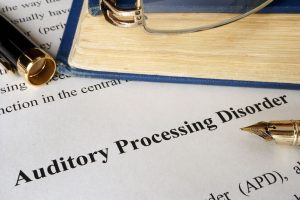What is APD?
Auditory Processing Disorder (APD), also referred to as Central Auditory Processing Disorder (C/APD), is the inability to attend to, discriminate among or between, recognize, or understand auditory information. APD is a sensory processing deficit that can negatively impact listening skills, spoken language, comprehension, learning and even social skills. APD is a dysfunction within the central auditory nervous system.
 Some children have a hard time with letter reversals; they may flip /b/ and /d/ for example. It is not that the letters are blurry; the brain is not perceiving or visually processing the information accurately. The same analogy can be applied for APD. A child may be able to “hear” just fine, but the brain’s ability to process what it hears is not functioning properly.
Some children have a hard time with letter reversals; they may flip /b/ and /d/ for example. It is not that the letters are blurry; the brain is not perceiving or visually processing the information accurately. The same analogy can be applied for APD. A child may be able to “hear” just fine, but the brain’s ability to process what it hears is not functioning properly.
The disorder frequently goes undiagnosed. Children with APD usually will pass a hearing test. APD can be misdiagnosed as Attention Deficit Disorder. Typically, APD co-exists with other disorders including AD/HD, dyslexia, and other learning disabilities.
An Auditory Processing Disorder can be the underlying cause of some learning disabilities, especially those associated with language processing. That is why it is critical to identify and treat the root of the problem and not just the symptoms.
What causes APD?
There is not one single reason why a child has APD. The following may be red flags that are commonly seen in children with APD:
- History of ear infections
- Prematurity
- Extremely high fever (over 105 degrees) as a very young child.
- Language delayed
- Brain injury
- Traumatic birth (extremely long labor, forceps used, stuck in birth canal, etc.)
- Genetic history
Characteristics of APD
Children with APD exhibit several of these symptoms:
- Difficulty listening in the presence of background noise
- Hears words incorrectly
- Difficulty learning to read
- Poor reading and spelling skills
- Difficulties with phonics and speech sound discrimination
- Difficulty telling sounds apart particularly vowels
- Saying “Huh or What”, ” I didn’t hear you”, or “I didn’t understand what you meant”
- Problems following directions, especially when complex
- Poor auditory memory skills, remembering what he/she heard
- Distracted by background noise
- Poor organization of verbal material
- Respond inconsistently or inappropriately to auditory information
- Difficulty attending to oral messages
- Difficulty learning songs or nursery rhymes and poor music, rhythm, and singing skills
- Delay in responding when participating in oral communication
- Tires easily when listening for extended periods
Screening for APD
Our clinic offers comprehensive Auditory Processing Disorder screening assessments. Auditory Processing Disorders cannot be diagnosed from screening tests alone. The screening helps determine if the child demonstrates age appropriate skills by passing the screening or whether results indicate the need for a more in-depth diagnostic Auditory Processing evaluation and/or treatment plan.
The screening tests we use best measure all areas that comprise APD. Specific tests administered depend on age of the child and primary challenges that the child is exhibiting. Testing measurements include:
- Screening Test for Auditory Processing Disorders in Children (SCAN-3:C)
- Screening Test for Auditory Processing Disorders in Adolescents and Adults (SCAN-3:A)
- Differential Screening Test for Processing (DSTP)
- Selective Auditory Attention Test (SAAT)
- Test of Auditory Perceptual Skills (TAPS-5)
- Goldman-Fristoe-Woodcock Test of Auditory Discrimination
- Hearing screening
Treating Auditory Processing Disorders
 Our clinic structures individualized treatment plans to address the specific areas of deficit identified in the Auditory Processing Disorder assessment. Treatment is conducted at our center in conjunction with home-based programming. We provide successful management in the educational setting focusing on directly treating the disorder, changing the acoustical environment, and improving the student’s listening and learning skills.
Our clinic structures individualized treatment plans to address the specific areas of deficit identified in the Auditory Processing Disorder assessment. Treatment is conducted at our center in conjunction with home-based programming. We provide successful management in the educational setting focusing on directly treating the disorder, changing the acoustical environment, and improving the student’s listening and learning skills.
As part of each child’s APD therapy plan, we work with the education system to support academic success for the student. Input to IEP goals and objectives, classroom accommodations, including strategies for the teacher, are offered.
If you would like to have your child undergo a comprehensive APD screening evaluation, contact our office at 480-219-3953 to make an appointment. We look forward to working with you and your child!
What causes APD?
There is not one single reason why a child has APD. The following may be red flags that are commonly seen in children with APD:
- History of ear infections
- Prematurity
- Extremely high fever (over 105 degrees) as a very young child.
- Language delayed
- Brain injury
- Traumatic birth (extremely long labor, forceps used, stuck in birth canal, etc.)
- Genetic history
Children with APD exhibit several of these symptoms:
- Difficulty listening in the presence of background noise
- Hears words incorrectly
- Difficulty learning to read
- Poor reading and spelling skills
- Difficulties with phonics and speech sound discrimination
- Difficulty telling sounds apart particularly vowels
- Saying “Huh or What”, ” I didn’t hear you”, or “I didn’t understand what you meant”
- Problems following directions, especially when complex
- Poor auditory memory skills, remembering what he/she heard
- Distracted by background noise
- Poor organization of verbal material
- Respond inconsistently or inappropriately to auditory information
- Difficulty attending to oral messages
- Difficulty learning songs or nursery rhymes and poor music, rhythm, and singing skills
- Delay in responding when participating in oral communication
- Tires easily when listening for extended periods
Our clinic offers comprehensive Auditory Processing Disorder screening assessments. Auditory Processing Disorders cannot be diagnosed from screening tests alone. The screening helps determine if the child demonstrates age appropriate skills by passing the screening or whether results indicate the need for a more in-depth diagnostic Auditory Processing evaluation and/or treatment plan.
The screening tests we use best measure all areas that comprise APD. Specific tests administered depend on age of the child and primary challenges that the child is exhibiting. Testing measurements include:
- Screening Test for Auditory Processing Disorders in Children (SCAN-3:C)
- Screening Test for Auditory Processing Disorders in Adolescents and Adults (SCAN-3:A)
- Differential Screening Test for Processing (DSTP)
- Selective Auditory Attention Test (SAAT)
- Test of Auditory Perceptual Skills (TAPS-5)
- Goldman-Fristoe-Woodcock Test of Auditory Discrimination
- Hearing screening
